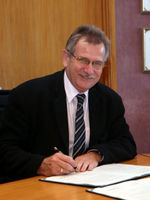Graduate Diploma in Tertiary Education
Developing capable tertiary educators who are critically reflective, culturally competent and future focussed.
An Otago Polytechnic Capable NZ programme.
Kia ora and welcome to the Graduate Diploma in Tertiary Education. This is a level 7, work-based qualification developed to create a tertiary educator who is critically reflective, culturally competent and future focused. You will develop skills to become an effective facilitator of learning, able to create enhanced learner-centred opportunities in a tertiary context.
| “
|
At Otago Polytechnic, we place a high priority on the skills and formal qualifications of our teachers to facilitate the learning journey for our students. As an open organisation, we want to share these opportunities for learning freely with the world using open educational resources. Building the Graduate Diploma in Tertiary Education upon a work-based learning philosophy, we are modelling the practice we expect from our educators in their own classrooms and we are committed to helping others achieve these goals.
|
”
|
| —Phil Ker, Chief Executive
Otago Polytechnic
|
|
Our aim is to develop capable tertiary eductors who are critcally reflective, culturally competent and future focussed. Through this work-based qualification you will become effective facilitators of learning, creating enhanced learner-centred opportunities.
As capable educators you will develop and deliver quality and innovative courses/programmes using a variety of approaches; whilst building partnerships with learners and colleagues; fostering communities of practice and enhancing their own professional development.
|
edit Graduate Profile Outcomes
A graduate of this qualification will be able to:
- articulate and implement their personal theory of practice and its evidence base including what it means to be a dual professional as both a tertiary educator and an expert practitioner the workplace;
- advance learning and teaching practice through critical self-reflection, evaluation and research;
- honour Te tiriti o Waitangi by integrating its principles into their teaching practice;
- practise and continue to develop their own cultural competence;
- develop and promote progressional, inclusive relationships with all learners in their care, relevant employers and the wider community;
- analyse relevant adult education and cognitive theory and draw on this in practice;
- design, facilitate and guide learning for each individual's success, using a wide range of context-appropriate strategies;
- lead evidence-based assessment practices for learning in a range of contexts, including APL and work based learning;
- monitor developments and trends in tertiary education, technology and practice, anticipate changes and adapt teaching and learning accordingly;
- foster communities of practice, identifying and sharing good practices across the organisation and beyond;
- foster collaboration and collegiality in order to catalyse team solutions to enhance learning; and
- facilitate the ability of graduates to participate with confidence in the future workforce as capable and sustainable practitioners.
|



